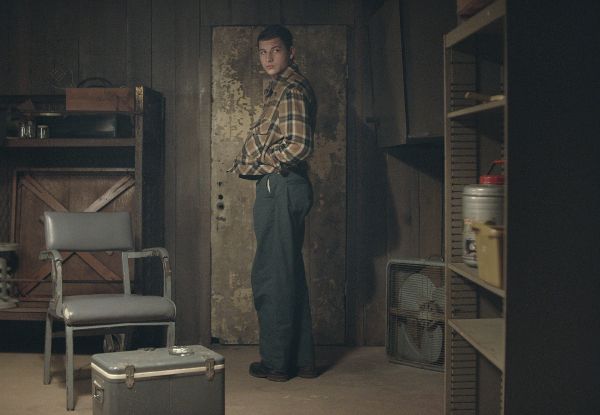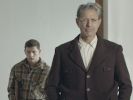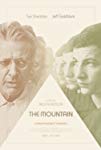Eye For Film >> Movies >> The Mountain (2018) Film Review
The Mountain
Reviewed by: Anne-Katrin Titze

'Operation Icepick' was the chilling name Walter Freeman gave to his tour around American state hospitals in the 1950s. He practiced lobotomies on the road, based on those pioneered by 1949 Nobel Prize winner Egas Moniz. The transorbital lobotomies are given through the eye, by severing the connection at the prefrontal cortex. As Rick Alverson told me of The Mountain: "The architecture of this moment in time and the fall from grace in the procedure itself is based on him [Freeman]. But it just uses sort of the veracity of that history and then the rest is fictionalised."
Blue Moon, the sound of rain, a tolling bell, and long silences lure us into the province of washed-out pinups on locker room walls and a garage sale (in a garage) that features a Planchette parlor game for automatic ghostwriting. Patients at the various institutions are positioned as if they were mushrooms or desperate leaves shaking in the wind, while the nurses wear most perfectly executed Fifties Hollywood makeup.

Rick Alverson's The Mountain, co-written with Dustin Guy Defa and Colm O'Leary, follows a boy called Andy (Tye Sheridan with wonder in his eyes) from life with his father Frederick (Udo Kier), a demanding ice skater, to becoming the photographer/assistant of Dr. Wallace Fiennes (Jeff Goldblum), traveling lobotomist, to meeting shaman Jack (Denis Lavant), the healer of souls, who lives with his daughter Susan (Hannah Gross) in an elegant midcentury house in the California woods.
The encounters on the road resemble those of an ancient fairy tale and the heightened, faded images by cinematographer Lorenzo Hagerman (Entertainment) are beautiful and eerie. There are casually folded-in musical numbers: a Busby Berkeley or Matthew Barney inspired ice rink formation, Goldblum tap-dancing up a storm at a bowling alley, Lavant being taken over by a trance at a séance.
Kier, Goldblum, and Lavant are never less than fantastic in their portrayal of modes of crazed, unreliably self-assured masculinity. This isn't Oz, the boy isn't Dorothy, but The Mountain does on some level feel like a vessel of Alverson's thoughts about the wizard and his false promises, and tinfoil gifts - the charade of a perpetually inspiring dream of the new world that never ends and never existed in the first place.
The car radio croons "Baby my heart is calling you." When the boy trails the doctor into the ferns and moss, distant thunder is rumbling once again. Perry Como's voice will take you to the Home on the Range.
A hotel, all red and claustrophobic, opens up to a breathtaking lake view. There is so much promise in locations, and Alverson uses them effectively as a lure. You may find yourself wondering, if the mountain is a holy mountain and what on earth that could mean. Lavant during the séance chants his commands: "Out of the body. Into the body." The film effects in waves.
A hermaphrodite impresses Andy, and more and more, while taking pictures, do his feelings awaken for the patients. As on and on he and Fiennes travel in the vanilla-coloured car, he ponders "Where do they go after you change them?" The Mountain invites and refuses. The world disguised as fetish. The boxy plaid lumberjack jackets are a little too boxy. The palest pistachio car interior a little too smooth. The comfortable objects of the imagined past a magnet into the present state of affairs.
Nabokov made us complicit with Humbert Humbert. In The Mountain we find ourselves on the lap of a showman lobotomist. We are not lobotomised here, quite the contrary. Wide awake in a dream or a nightmare, America in the last breath of its 21st century teenage years, should have a good look at this land, where unruly women are lobotomised and white men dance their reckless conjurers' dance.
Reviewed on: 28 Jul 2019















